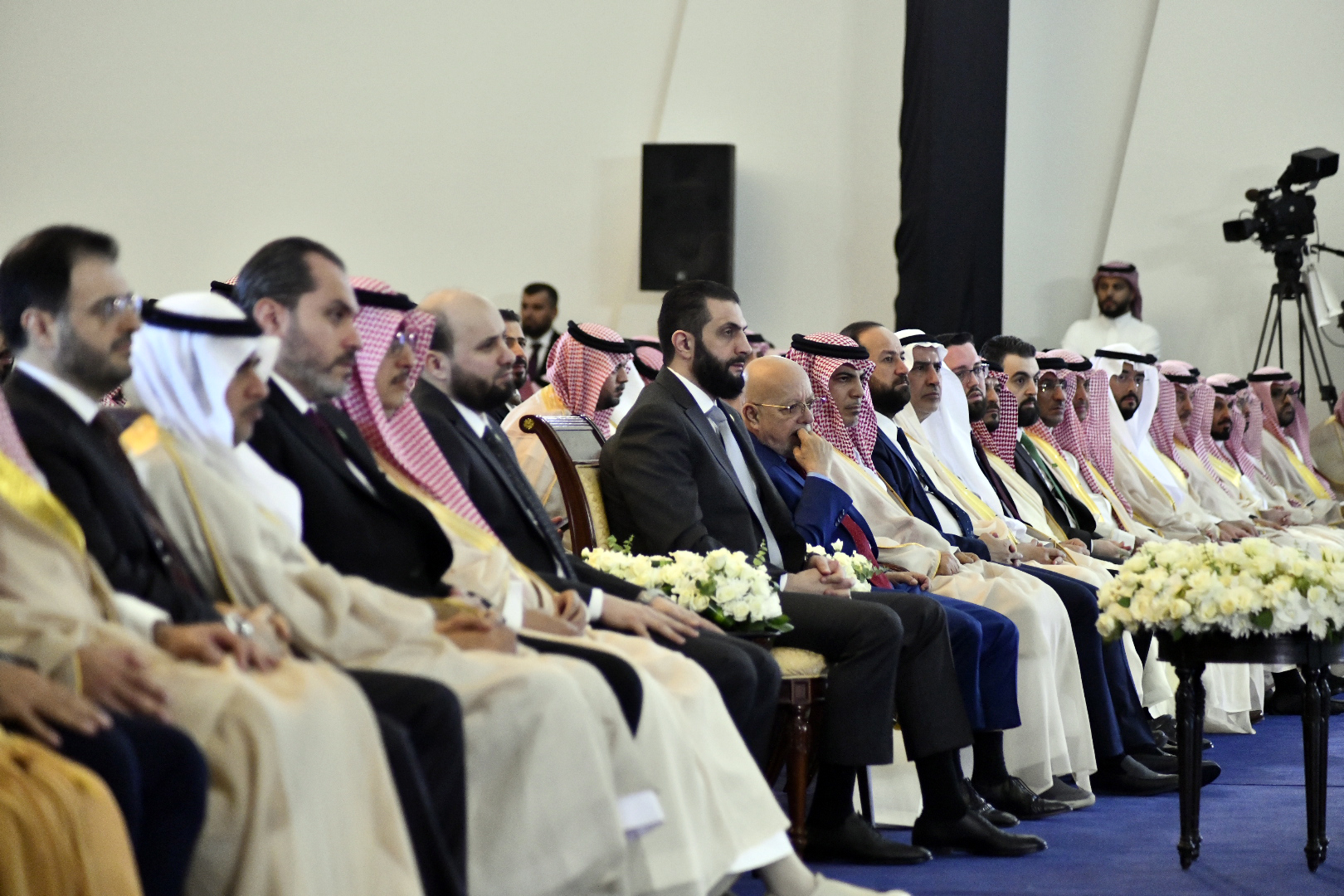The West Is Helping Syria Build a Government No Minority Wants to Join

Editor’s Note: The United States and European Union are trying to build a relationship with Syria’s new government, but it is not clear what vision Ahmed al-Sharaa, the current president, has for the future of the country. Haddon Barth, of Princeton University, writes that there are now worrying signs that the new government is consolidating power and excluding key parties, and that the West should use its leverage to encourage a more representative, more inclusive political system.
Dana Stuster
***
Since Bashar al-Assad’s fall, the success of Syria’s political transition has hinged on bringing the autonomous Kurdish northeast into the central government. That effort began to unravel this month: A high-profile conference in the northeast hosted prominent separatists, Kurdish officials accused Damascus of breaking a ceasefire, and integration talks in Paris were abruptly scrapped. Turkey has since readied forces to support a limited Syrian operation against the Syrian Democratic Forces (SDF), the Kurdish-led northeastern coalition backed by the West to counter the Islamic State, escalating the chances of military confrontation.
The current escalation reflects the repercussions of the West’s chosen course. Since lifting sanctions in June, the United States and European Union have embraced the transitional government in Damascus, ignoring its consolidation of power. The consequences of this policy have now come home to roost: The transitional government has established a political order in Syria that no minority group would willingly join. Moving forward, if Washington and Brussels wish for the political factions in the northeast to peacefully integrate, they must first use their influence with Damascus to demand a more inclusive political system.
Consolidating Power in Damascus
Western policy rests on trust in Hayat Tahrir al-Sham (HTS), the insurgent organization that seized power last fall, but its record offers little reason for confidence. President Ahmed al-Sharaa has succeeded in calming the political landscape largely by centralizing power. In February, the new leadership presented a hastily convened, single-day national dialogue conference as a symbol of broad participation. In reality, the conference was dismissed by major civil society groups and excluded Kurdish representatives. Just two weeks later, a constitutional committee composed of seven figures chosen directly by Sharaa produced an interim constitution that entrenched his authority.
That document hands Sharaa sweeping powers, including the right to appoint one-third of the transitional parliament, the entire Constitutional Court, and the full cabinet. Elections for the remaining two-thirds of parliamentary seats are scheduled for September, but the Syrian public will not be voting. Instead, a “high committee” hand-picked by Sharaa will appoint regional committees to choose the representatives, giving the president indirect control over the entire legislature. As constitutional expert Zaid Al-Ali notes, the system depends entirely on Sharaa’s personal restraint—should he renege on his promises of inclusion, no check exists to prevent one-party rule.
The same lack of checks on Sharaa’s political authority now extends to the country’s finances. In July, Sharaa launched a sovereign wealth fund with murky financing and an appointed governing board, raising fears it could be used to siphon off public assets and launder illicit assets. A month later, the government announced more than $14 billion in foreign infrastructure deals, many of which have since been linked to shell companies with little verifiable history. Together, these moves enable Sharaa to channel public wealth into his inner circle if he chooses.
A series of violent episodes has further deepened doubts about HTS’s capacity for accountable governance. In early March, government and pro-government forces responded to insurgent attacks in coastal Syria by killing more than 1,500 Alawite civilians. More recently in Suwayda, government forces committed serious human rights abuses against Druze civilians after being deployed to restore order between Bedouin and Druze militias. An anticipated government investigation into the coastal violence blamed only remnants of pro-Assad forces, an implausible conclusion that cast doubt on the transitional government’s commitment to accountability.
These abuses have pushed minority discontent to the brink. On Aug. 8, the Kurdish-led administration hosted its own national dialogue conference in Hasakah, platforming separatist figures from multiple communities, including prominent Druze leader Hikmat al-Hijri. Damascus denounced the gathering and withdrew from talks in Paris on integrating the Kurdish administration into the Syrian state. Ceasefire violations between the central government and the SDF in the northeast have since multiplied, while the transitional government and Turkey have begun preparations for an operation against the SDF.
Backing a Strongman at the Expense of Inclusion
Even as Damascus has consolidated power and alienated minorities, Washington and Brussels have continued to embrace the government. After the Suwayda abuses, U.S. Special Envoy Tom Barrack doubled down on support for the transitional authorities, maintaining that they have “conducted themselves as best they can,” and issued a 30-day deadline for the northeast’s integration. Barrack also appeared alongside Syrian officials at the announcement of $14 billion in questionable foreign investment deals. On her last trip to Damascus, EU Commissioner for the Mediterranean Dubravka Šuica called Syria a “full European partner” and pledged long-term support. Despite lip service to principles of an “inclusive transition,” there has been no call for credible September elections, questioning of HTS’s tightening grip on Syrian wealth, or demand for broad participation in drafting the permanent constitution. The West has effectively declared the political transition “good enough” before it has even begun in earnest.
In some respects, the West’s pivot toward Damascus is entirely predictable. Washington wants a Syria stable enough to limit Iranian influence, prevent an Islamic State resurgence, and eventually push out Russian bases. EU states share those desires and add another: They want a Syria capable of repatriating refugees. After the influx of Syrian refugees in the mid-2010s fueled far-right movements across Europe, even liberal governments hardened their rhetoric and border policies. Now, by easing sanctions and investing in Syria’s recovery, Europe hopes to slow Syria’s outward migration and make return more appealing for displaced Syrians.
But embracing Damascus unconditionally will not reward the West with the stable Syria it desires. The reintegration of armed minority groups is unlikely to succeed without genuine efforts toward political inclusion. Though Damascus denounced the dialogue conference hosted in the northeast, it was the predictable outcome of excluding the Kurds from February’s dialogue. Minorities will not return to a political system controlled exclusively by Sharaa, an economic system dominated by HTS, or a central army that has faced no accountability after committing atrocities against their communities. With tensions now at a breaking point and both sides making military preparations, the northeast appears prepared to risk war rather than accept such terms.
The West’s policy also sends a dangerous message to the region: that armed groups can seize power, offer a shallow appearance of inclusivity, and still garner international legitimacy. Authoritarian regimes elsewhere will take note, learning that Europe will look the other way as long as they promise order. Stability without inclusion will only fuel the very grievances that have long destabilized the region.
The West still has leverage and should use it to push for tangible reforms. The Syrian government relies on Western aid, diplomatic recognition, and high-profile visits to maintain domestic legitimacy. The United States and European Union can make that conditional on genuine inclusivity in the September elections, transparency around economic deals, and the inclusion of opposition groups and civil society in future rounds of constitutional dialogue. Without these minimum conditions, Washington and Brussels risk jeopardizing the stability they so desperately seek.


.jpg?sfvrsn=d27bd863_5)

